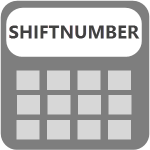
Use Floor() to get the largest integer that is less than or equal to a particular number.
Read more

Use Ceil() to get the smallest integer that is greater than or equal to a particular number.
Read more

Use ShiftNumber() to get the number of the shift in effect at a certain time.
Read more

Use ShiftEnd() to get the time of the end of the shift.
Read more

Use Round(0 to get the rounded value of a number.
Read more

Use Rand() or Random() to get a random number.
Read more

Use ShiftStart() to get the time of the start of the shift .
Read more

IFS OI Server provides the following functions for performing several common mathematical calculations: Cos, Sin, Tan, ArcCos, ArcSin, ArcTan, Log, Log10, Abs, Exp, Sqrt, Fix
Read more

IFS OI Server provides functions for calculating the time of specific calendar periods. The functions are: CalenderDayStart, CalendarMonthEnd, CalendarMonthStart, CalendarWeekend, CalendarWeekend2, CalendarWeekStart, CalendarWeekStart2, Midnight, DaysInMonth.
Read more

IFS OI Server provides the following functions for calculating the time of specific production periods: ProductionDay, ProductionDayStart, ProductionMonthEnd, ProductionMonthStart, ProductionWeekStart.
Read more